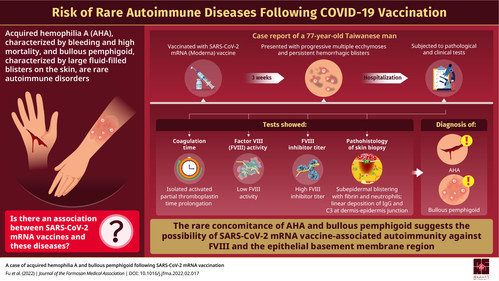TAINAN, Taiwan, August 3, 2022 /PRNewswire/ — When the body’s immune system turns itself on and attacks the body’s healthy cells and organs, we develop autoimmune diseases. A rare entry in the list of autoimmune diseases is acquired hemophilia A (AHA), in which spontaneous bleeding occurs in patients with no history of the disease. Although AHA is often associated with significant mortality due to its rarity, there is very little data on the underlying physiological processes.

Scientists find a possible link between the COVID vaccine and autoimmune diseases like AHA
Are other diseases with significant immunosuppression, such as viral infections, associated with AHA? A group of researchers led by Dr. Ya Ting Hsu and Dr. Peng Chan Lin of the NCKU hospital, Taiwanrecently reported a case that suggests such a possibility.
In her case report published in the Journal of the Formosan Medical Association, the researchers describe the symptoms, diagnosis and treatment of a 77-year-old Taiwanese man who presented with bruised-looking skin on his forearms and legs, and bleeding blisters on his hands and torso three weeks after receiving the second dose of mRNA Moderna vaccine for the viral infection COVID -19 Pathologic and clinical tests, including coagulation factor VIII (FVIII) titers and estimation of FVIII inhibitor levels, and skin biopsy confirmed the co-occurrence of AHA with bullous pemphigoid, a rare autoimmune skin disease. “The simultaneous diagnosis of AHA and bullous pemphigoid is very rare. Several studies have shown that drugs or vaccines play a role in inducing bullous pemphigoid, but progression to this condition is still unclear. Although the causality and pathogenesis of the autoimmune diseases in our patient remains unconfirmed, we reported this case to raise awareness of this rare phenomenon following the administration of the SARS-CoV-2 mRNA vaccine,” explains Dr. hsu
To date, mRNA vaccines are the first line of defense against SARS-CoV-2-induced COVID-19. Awareness of autoimmune diseases associated with these vaccines can help physicians provide timely treatment and prevent significant morbidity and mortality in patients. “There are several questions that need to be asked if we are to understand vaccine-related autoimmune diseases. For example, do patients with known autoimmune diseases have a higher risk of developing a vaccine-related autoimmune disease? Can they safely get a SARS-CoV-2 mRNA vaccine? Will the vaccine trigger a flare-up of an existing autoimmune disease? Are these patients treated differently?” watching Dr. Lin while explaining the need for comprehensive, timely and honest reporting of relevant incidents.
In addition to reporting their case, the researchers reviewed the existing literature and identified six other vaccine-related cases of AHA that had been reported since 2021. They found that all six patients were given either the Moderna or Pfizer-BioNTech vaccine and that in all cases treatment took less time than for non-vaccine associated AHA. In addition to the six cases related to the COVID-19 vaccination, two other AHA cases were also reported after influenza vaccination that uses a different antigen. The researchers suggest that as more autoimmune diseases are reported following administration of a SARS-CoV-2 mRNA vaccine, further investigations into their pathogenesis can be conducted, which can then help identify the potential risk groups.
These results indicate a possible link between SARS-CoV-2 mRNA vaccines and autoimmune diseases such as AHA. More studies are needed to unequivocally prove a causal relationship between the two. Timely reporting of such cases can better understand the short- and long-term side effects of COVID-19 mRNA vaccines and improve patient management for better outcomes.
Relation
Original paper title: A case of acquired hemophilia A and bullous pemphigoid after SARS-CoV-2 mRNA vaccination
Diary: Journal of the Formosan Medical Association
DOI: https://doi.org/10.1016/j.jfma.2022.02.017
Contact:
Yu Ting Chen
+886 6 2757575 extension 80921
[email protected]
SOURCE National Cheng Kung University

#link #COVID19 #vaccination #autoimmune #diseases #investigation #NCKU #researchers

Leave a Comment